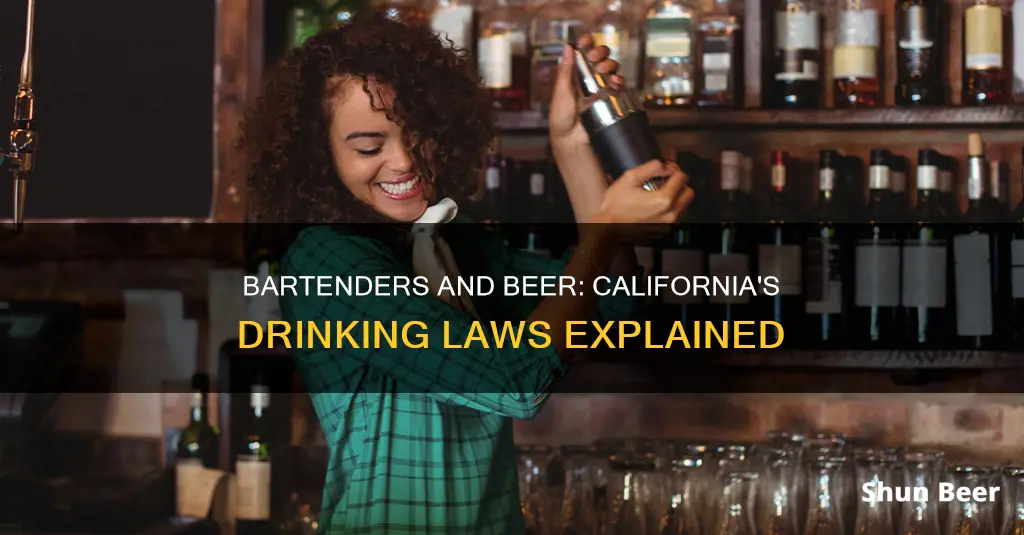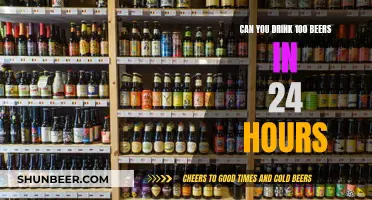
Bartending is a fast-paced job that requires a lot of responsibility. In California, bartenders are required to be at least 21 years old and to obtain a license by completing Responsible Beverage Service (RBS) training. This training helps bartenders develop techniques to identify and intervene when serving alcohol to customers. While drinking on the job is prohibited in California, different states have different laws, and some even allow bartenders to drink while working.
| Characteristics | Values |
|---|---|
| Bartenders drinking on the job | Prohibited |
| Reason | Bartenders need to accurately monitor patrons' intoxication levels and cut them off if needed |
| Penalty for violation | Fines for the business |
| Age requirement | 21 |
| Training | 40 hours of classroom curriculum |
| Exam | RBS exam with a passing score of 70% |
What You'll Learn

California prohibits bartenders from drinking during their shift
California has a clear stance on bartenders drinking during their shifts. The California Department of Alcoholic Beverage Control (ABC) prohibits bartenders from drinking alcohol at any point during their shift—before, during, or after serving alcohol. This means that bartenders cannot consume any alcoholic beverages while they are on duty and working at a licensed establishment that sells alcohol. The rules are intended to ensure that bartenders can accurately monitor their patrons' intoxication levels and stop serving them if needed.
The consequences of violating these rules can be significant. If a bartender is found to be drinking during their shift, the business can face fines, and there is also the risk of the business losing its liquor license. In addition, bartenders who drink on the job may face criminal public drunkenness charges, and the bar itself risks liquor license suspension if intoxicated employees continue to work. These potential consequences highlight the importance of prioritizing responsible alcohol service and complying with state regulations.
To become a bartender in California, individuals must meet certain legal requirements and obtain the necessary certifications. California requires all bartenders to be at least 21 years old, which is the legal age to purchase and consume alcohol in the United States. Additionally, bartenders need to complete Responsible Beverage Service (RBS) training and pass the RBS exam to earn their certification. This training helps servers develop techniques to identify and intervene when necessary, covering topics such as state laws, regulations, and intervention skills.
While staff drinking policies may vary at different establishments, it is crucial for bartenders in California to be aware of and comply with the state's prohibition on drinking during their shifts. This regulation is in place to promote the safety and well-being of both the bartenders and their customers.
Exploring Jordan's Beer Culture and Drinking Laws
You may want to see also

Bartenders must be 21 to serve alcohol in California
In California, the legal drinking age is 21 years old, and the same age requirement applies to bartenders serving alcohol. This means that individuals must be at least 21 years old to pour and serve alcoholic beverages in the state. The California Department of Alcoholic Beverage Control enforces this regulation, which is intended to ensure that bartenders can accurately assess patrons' intoxication levels and stop serving them if necessary.
The age requirement is part of California's alcohol service laws, which also include training and certification mandates. As of July 1, 2022, all bartenders and their managers in California must possess a Responsible Beverage Server (RBS) Certification issued by the California Department of Alcoholic Beverage Control (ABC). This certification is obtained by completing the required alcohol server training and passing the state exam. The training covers topics such as legal obligations, recognising signs of intoxication, and implementing measures to prevent overconsumption and related risks.
The consequences of non-compliance with California's alcohol service laws can be significant. For example, any individual who sells, serves, or purchases alcohol for a person under 21 can be charged with a misdemeanour, regardless of whether they knew the person was underage. Similarly, serving alcohol to an obviously intoxicated person is also a misdemeanour offence, punishable by fines of up to $1,000 and/or six months in county jail.
While the legal drinking age in California is 21, there is an exception for individuals under 21 consuming alcohol in private locations. Minors are permitted to consume alcohol in private places if a parent, guardian, or relative over the age of 21 is present. However, driving under the influence (DUI) laws still apply to individuals of all ages, and any amount of alcohol in a minor's system while operating a vehicle is illegal.
Beer and Radiation: What's Safe to Drink?
You may want to see also

Bartenders in California must complete RBS training
In California, bartenders are not allowed to drink at any point during their shift—before, during, or after providing alcohol service. This is to ensure that bartenders can accurately monitor patrons' intoxication levels and prevent them from driving drunk.
To serve alcohol in California, bartenders must complete Responsible Beverage Service (RBS) training. This training is mandatory for all bartenders and alcohol servers in California and teaches them to responsibly serve alcoholic beverages for on-premises consumption. The course covers California laws, responsible sale and service of alcohol, carding and identification, standard drink sizes, effects of alcohol, and more. It can be completed within 2 hours or less and is available in multiple languages.
To get certified, servers and bartenders must first register in the RBS Portal and obtain a 9-digit Server ID. They then need to complete the RBS Training course from an approved RBS training provider within 60 days of their hire date. After completing the course, they must pass the California RBS exam within 30 days to receive their certification, which is valid for 3 years.
By completing RBS training, bartenders can ensure they are compliant with California laws and are equipped with the knowledge to responsibly serve alcohol to their customers.
Helium Beer: Science Behind the Fizzy Beverage
You may want to see also

California bartenders must pass the RBS exam
California has strict laws regarding alcohol consumption for bartenders. The California Department of Alcoholic Beverage Control prohibits bartenders from drinking at any point during their shift—before, during, or after providing alcohol service. Bartenders who violate these rules can face criminal public drunkenness charges, and the bar itself risks losing its liquor license if intoxicated employees remain on duty.
To address these issues and ensure responsible alcohol service, California requires all bartenders to pass the Responsible Beverage Service (RBS) exam and obtain their RBS certification. This regulation has been in effect since July 1, 2022, and applies to anyone who serves alcoholic beverages in California, including bartenders, servers, waiters, and managers. The RBS exam ensures that bartenders are educated on the dangers of serving alcohol to minors and over-serving patrons, helping to reduce alcohol-related harm in California communities.
To become RBS certified, bartenders must first register in the RBS Portal and complete their training from an authorized RBS Training Provider. The training course can be completed within 2 hours or less and is available in multiple languages, including English, Chinese, Korean, Spanish, and Vietnamese. After completing the training, bartenders must pass the ABC Alcohol Server Certification Exam within 30 days. The exam is "open note," and most people can complete it in a very short amount of time. A passing score of 70% or better is required to receive the ABC RBS 3-year certification.
In addition to bartenders, bouncers and security personnel who check IDs at licensed premises are also required to be RBS certified. This ensures that all staff members involved in serving alcohol or verifying customer ages are properly trained and certified.
By implementing the RBS certification requirement, California is prioritizing the safety and well-being of its residents and visitors. Bartenders play a crucial role in responsible alcohol service, and the RBS exam provides them with the knowledge and skills necessary to make informed decisions when serving alcoholic beverages.
Drinking Non-Alcoholic Beer While Driving in California: Is It Legal?
You may want to see also

Bartenders are responsible for ensuring customer safety
In California, bartenders are prohibited from drinking at any point during their shift. This includes before, during, and after providing alcohol service. The rules are intended to ensure bartenders can accurately monitor patrons' intoxication levels and stop serving them if needed.
Regardless of location, bartenders are responsible for ensuring customer safety and preventing excessive drinking and drunk driving. This includes:
- Checking the identification of customers to ensure they are of legal drinking age.
- Refusing to serve alcohol to visibly intoxicated patrons.
- Ensuring that drinks are not served to minors or to people who appear to be driving.
- Arranging for transportation home or calling a taxi for intoxicated patrons.
- Being trained to recognize and properly validate acceptable forms of identification.
- Notifying a manager or security personnel and documenting incidents involving drunk or disorderly customers.
Bartenders may also be held liable for injuries or accidents resulting from serving alcohol to intoxicated patrons. Therefore, it is crucial for them to prioritize responsible alcohol service and ensure their patrons' safety.
Beer and Breastfeeding: What's Safe?
You may want to see also
Frequently asked questions
No, the California Department of Alcoholic Beverage Control prohibits bartenders from drinking at any point during their shift—before, during, or after providing alcohol service.
Violations can result in fines for the business.
Bartenders need clear minds to handle alcohol responsibly and ensure customer safety.
It can lead to safety and liability issues. Bartenders are responsible for ensuring that they and their patrons are following established protocols and laws regarding alcohol service.
Yes, some states like Nevada, Michigan, Idaho, New Mexico, Louisiana, Missouri, Virginia, and Oregon allow bartenders to drink on the job.







